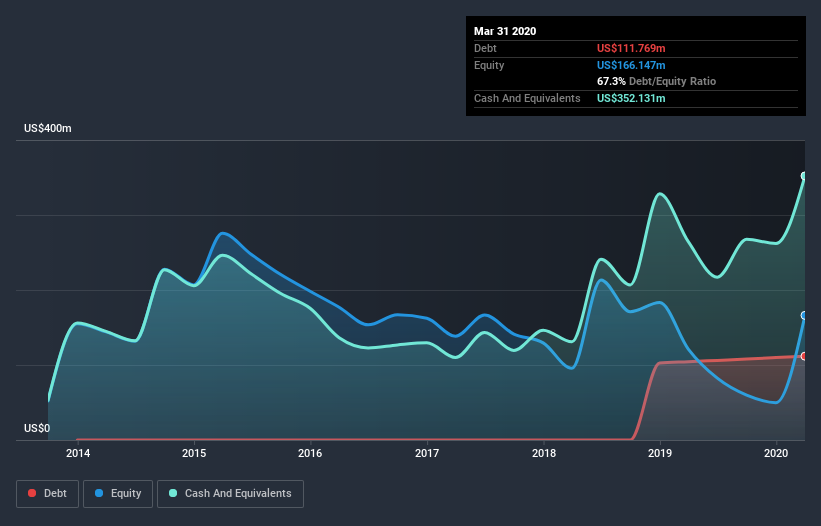Does Karyopharm Therapeutics (NASDAQ:KPTI) Have A Healthy Balance Sheet?

Legendary fund manager Li Lu (who Charlie Munger backed) once said, 'The biggest investment risk is not the volatility of prices, but whether you will suffer a permanent loss of capital.' So it might be obvious that you need to consider debt, when you think about how risky any given stock is, because too much debt can sink a company. Importantly, Karyopharm Therapeutics Inc. (NASDAQ:KPTI) does carry debt. But the more important question is: how much risk is that debt creating?
What Risk Does Debt Bring?
Debt is a tool to help businesses grow, but if a business is incapable of paying off its lenders, then it exists at their mercy. If things get really bad, the lenders can take control of the business. However, a more common (but still painful) scenario is that it has to raise new equity capital at a low price, thus permanently diluting shareholders. By replacing dilution, though, debt can be an extremely good tool for businesses that need capital to invest in growth at high rates of return. When we think about a company's use of debt, we first look at cash and debt together.
View our latest analysis for Karyopharm Therapeutics
What Is Karyopharm Therapeutics's Debt?
The image below, which you can click on for greater detail, shows that at March 2020 Karyopharm Therapeutics had debt of US$111.8m, up from US$104.4m in one year. But it also has US$352.1m in cash to offset that, meaning it has US$240.4m net cash.
How Healthy Is Karyopharm Therapeutics's Balance Sheet?
The latest balance sheet data shows that Karyopharm Therapeutics had liabilities of US$49.7m due within a year, and liabilities of US$200.3m falling due after that. Offsetting these obligations, it had cash of US$352.1m as well as receivables valued at US$9.28m due within 12 months. So it can boast US$111.4m more liquid assets than total liabilities.
This short term liquidity is a sign that Karyopharm Therapeutics could probably pay off its debt with ease, as its balance sheet is far from stretched. Simply put, the fact that Karyopharm Therapeutics has more cash than debt is arguably a good indication that it can manage its debt safely. There's no doubt that we learn most about debt from the balance sheet. But ultimately the future profitability of the business will decide if Karyopharm Therapeutics can strengthen its balance sheet over time. So if you're focused on the future you can check out this free report showing analyst profit forecasts.
Over 12 months, Karyopharm Therapeutics reported revenue of US$59m, which is a gain of 189%, although it did not report any earnings before interest and tax. So there's no doubt that shareholders are cheering for growth
So How Risky Is Karyopharm Therapeutics?
Statistically speaking companies that lose money are riskier than those that make money. And the fact is that over the last twelve months Karyopharm Therapeutics lost money at the earnings before interest and tax (EBIT) line. Indeed, in that time it burnt through US$169.4m of cash and made a loss of US$186.4m. However, it has net cash of US$240.4m, so it has a bit of time before it will need more capital. The good news for shareholders is that Karyopharm Therapeutics has dazzling revenue growth, so there's a very good chance it can boost its free cash flow in the years to come. While unprofitable companies can be risky, they can also grow hard and fast in those pre-profit years. When analysing debt levels, the balance sheet is the obvious place to start. However, not all investment risk resides within the balance sheet - far from it. Consider risks, for instance. Every company has them, and we've spotted 2 warning signs for Karyopharm Therapeutics you should know about.
Of course, if you're the type of investor who prefers buying stocks without the burden of debt, then don't hesitate to discover our exclusive list of net cash growth stocks, today.
This article by Simply Wall St is general in nature. It does not constitute a recommendation to buy or sell any stock, and does not take account of your objectives, or your financial situation. We aim to bring you long-term focused analysis driven by fundamental data. Note that our analysis may not factor in the latest price-sensitive company announcements or qualitative material. Simply Wall St has no position in any stocks mentioned.
Have feedback on this article? Concerned about the content? Get in touch with us directly. Alternatively, email editorial-team@simplywallst.com.

 Yahoo Movies
Yahoo Movies 

